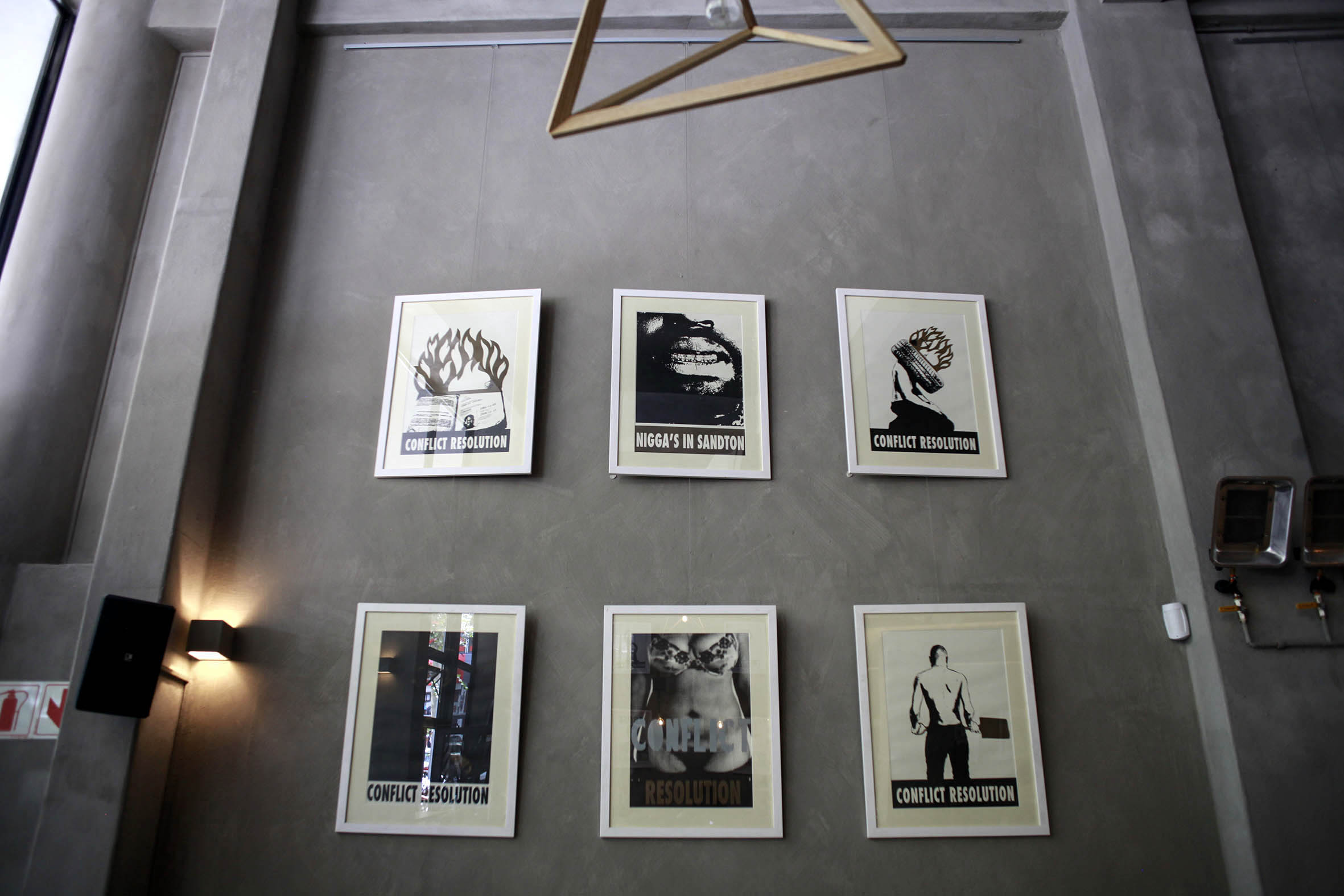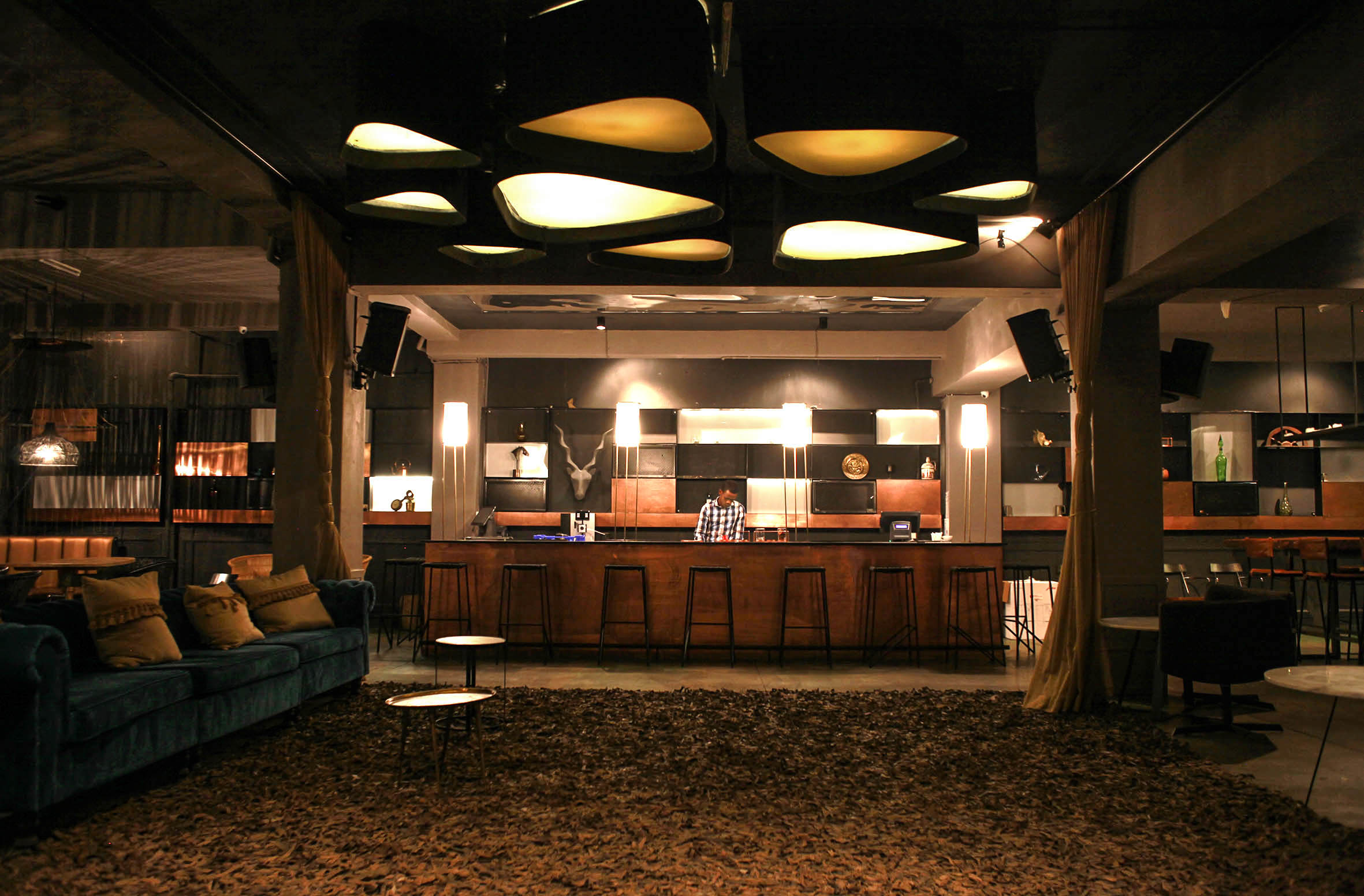Soul mates: DJ Kenzhero and Bradley Williams desired a space that would combine their interests and so they opened Artivist. Photos: Oupa Nkosi
About six months ago, long-time friends Bradley Williams and DJ Kenzhero opened up Artivist. In the heart of Braamfontein, Johannesburg, the restaurant-cum-gallery seeks to become a lighthouse of cultural experiences. Zaza Hlalethwa spoke to its owners
How did you get into business with one another?
Bradley: Him and I had this chat for two years. We found that we couldn’t produce the quality of events or curate the details that we wanted. It was partly a random opportunity that came our way, of a restaurant/bar that was on the market.
But it was also a window for me because I had just completed my MBA and quit my job. Kenny was producing a new event series. Obrigado was still young.
Kenzhero: Maybe even longer. I think during the times when I was doing whatever and he was doing whatever, the end goal was for both of us, individually, to start a space.
I managed to have spaces and events that were different from this — Obrigado, Basha Uhuru, Cold Studios. I was kinda also fluid. That was kind of a throw forward to this. It was gyming.
Bradley: But also Kenny and I knew that we needed to do something bold in the neighbourhood as black entrepreneurs to represent the black narrative in culture. We saw that as activism as well.
We have a responsibility. I mean, there is a business plan that shows our revenue targets. Some of the revenue targets are dependent on strong revenue-generating programming. Typically, we need to throw house parties, we need to get these kids in here and make sure it’s packed.
We can’t do that because we have a responsibility. We know where investment needs to go. We had to create value for the community and not just take from them, which we saw all these other dudes doing.
The other problem was all the owners happened to be white; they don’t care about the community. With our programming, there’s a sense of artistry versus the commercial viability of things.
Kenzhero: We want to perfect the experience and bring value to this location.
How did you come up with the name?
Bradley: The name came from our experience in Braam. We felt like we needed to maintain the character of the city. Think about the stuff that was going on at the time, #FeesMustFall, all the labour protests, the [ANC] Youth League is up here, EFF [Economic Freedom Fighters], Section27, Cosatu is here. So there’s a lot of activism in the space.
Then there’s also a strong creative community here from cool fashion kids on Juta, sneaker heads, the graffiti, the galleries, the musicians who frequent this spot. For us, that was the community so we took those as insights and went through a meditation of some sorts.
At the time, I was also managing Thandiswa Mazwai and there was inspiration from what she was doing that I saw her as someone who personifies this concept.
How does this responsibility affect the income?
Bradley: For us, it’s all in the design. We have got walls so we put art up there, then we can sell the art. We have ticket sales for the basement downstairs — it’s a food and a bar spot — so all of these things have gone into a diverse business model instead of focusing on just one, which we felt other spaces weren’t doing.
If you ask me six months down the line, what does that mean? This is the whole experiment. Can we achieve the culture aspirations of our global community and make a profit? That’s the continuous push and pull that we’re experiencing six months into it. We are not quite there yet in finding the balance.
Kenzhero: The Orbit is a good case study and a classic example of economy meets reality. In this climate. We started a business in the worst climate economically. We are aware of that. The Orbit happened to live in it, they’re not new. We’re fresh, we still have the energy and think we can take on the world. But the learning from The Orbit is that we are not safe in this climate.
How does the menu complement the vision?
Kenzhero: Like all the other factors, it is influenced by our experience. The way we interact with the economy and the politics of this country, where we want the music to go, what we now eat at this age is what made this possible.
Bradley: With the menu, the plan was a pan-African menu. We had a whole repertoire, a list of recipes. But we scaled it down to a SADC [Southern African Development Community] menu partly because the supply is consistent and there is a skill set of making this stuff.
Kenzhero: I was personally worried about the mogodu and I told them I only eat mogodu from home. That’s a sentiment that a lot of people share. But they walk away from here saying, ‘Oh my god, I can go eat mogodu somewhere else now’.
We’re surrounded by all these establishments that make chicken. How are we gonna make our chicken better? We had to take classic dishes and make them into unforgettable experiences. I have never eaten mogodu with chorizo in my life.
So the location was a deliberate decision?
Kenzhero: We also looked at Parkhurst, Rosebank, Melville.
Bradley: We liked Braam equally, if not more. This part of Reserve Street was legendary. It was a low- rental opportunity for small businesses. This was a chesa nyama spot, Mzitho’s. This spot used to have queues up to Jorissen Street. On a Friday, it was insane, just for the way Mzitho made the chuck. I recapped that I had been here before and it was literally this kitchen.
Mzitho died so then they rebranded the street. South Point felt like they could create a curated community of some sorts. Around the back is a Puma store and they have got the courtyard, so we’re trying to connect all the dots between us and these guys to create a vibe. So it’s a growing culture hub.
What has the reception been to making the space a gallery as well?

Artivist is currently exhibiting Kudzanai Chiurai ‘What More Can I Say?’. Photo: Oupa Nkosi
Bradley: Kenny and I and our immediate friend network are now interested in art. We’re trying to offer this space as the go-to for that. If you have ever felt that the high-end galleries were out of reach, this is the bridge into art. Some of these pieces were sold by Kenny.
Kenzhero: [The art world] kind of know the potential we have but it’s a field they haven’t explored because they’re very conservative. They have an elitist problem. We’re trying to break that. By virtue of coming to have lunch or a drink or coming to a party you’re seeing the work.
Bradley: There’s this idea about us from the art world, the veterans are not sure about us, dude. We have gone to them and said we have got this space where people come hang out and drink but they also now have an opportunity to immerse themselves in art.
They’re not engaging with art in the classic white-cube format, which is usually an occasion like going to the theatre. We had these conversations with some gallerists and curators. I think it’s a work in progress.
Tell me about the Untitled basement

Tucked away within the confines of the Artivist space, the Untitled basement (Photo: Oupa Nkosi)
Bradley: We really want this place to be a natural continuation of the space upstairs. So if you were having lunch and you just want to hide out and have a change of scenery, this will be your spot. It’s like a hidden member’s club.
We host hip-hop jazz nights here; this is where we hosted Shabaka [Hutchings and the Ancestors]. Bands perform in the centre, people sit on cushions around the band and we create this amphitheatre type of seating where it goes higher.
It’s quite an intimate experience because it feels like you’re part of the band’s rehearsal during the performance. That’s what we like about the space.
You’re wearing all these hats — curator, restaurateur, event curator. Doesn’t it become overwhelming?
Bradley: In terms of ventures losing money, we have a long view with this thing. The payback period is tough. We’re financed, we have loans, we’re in debt essentially. We’re hoping to sustain the business so it can keep paying for itself at least.
Kenzhero: I have taken some Ls. It’s not carelessness, it’s changing of the market and the economy, shitty landlords.
Bradley: It’s extremely overwhelming.
Kenzhero: But it’s also extremely complementary. The job is fucken amazingly tough. We are actually learning.
The Artivist is at 7 Reserve Street, Braamfontein, Johannesburg